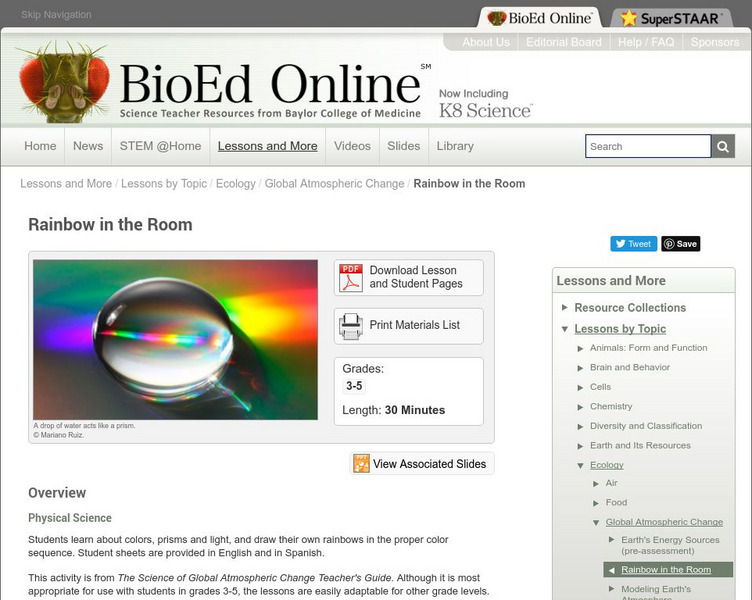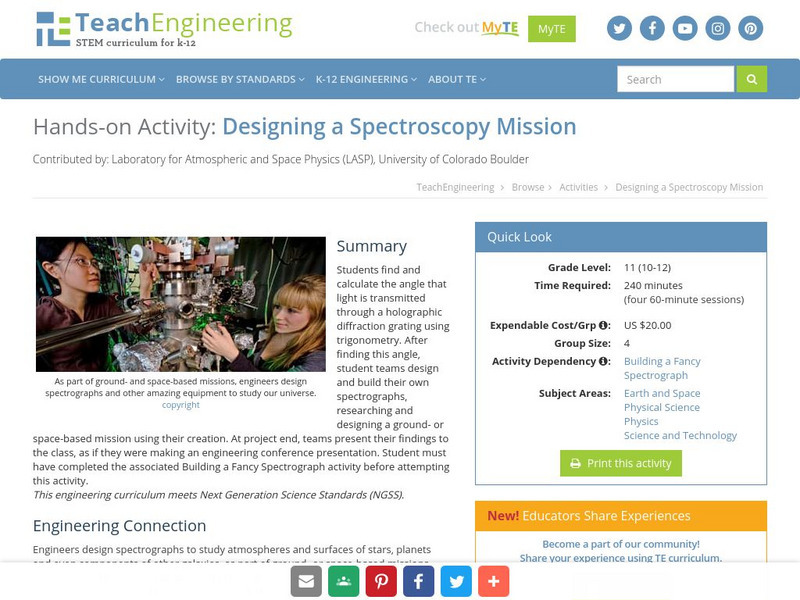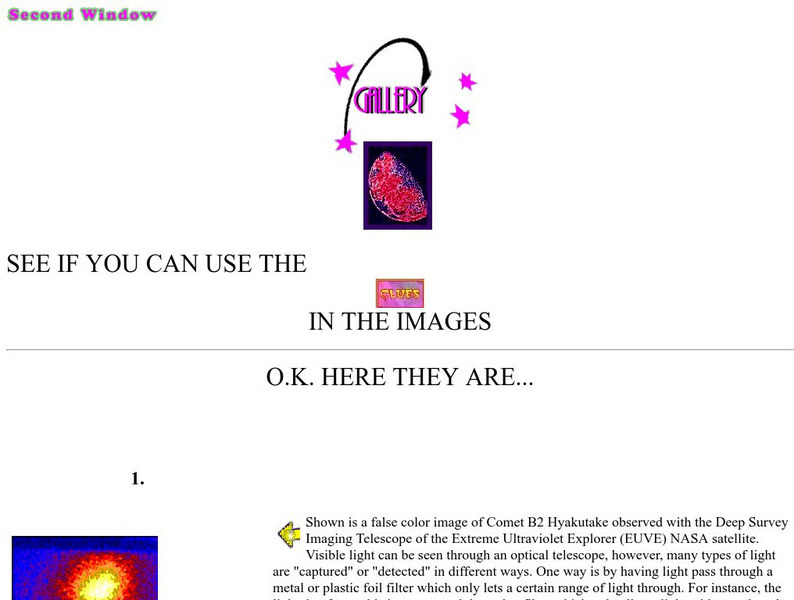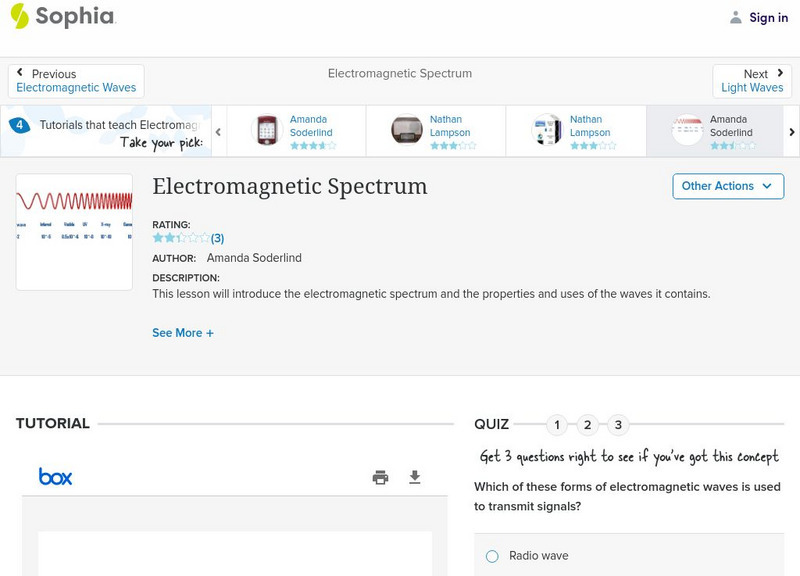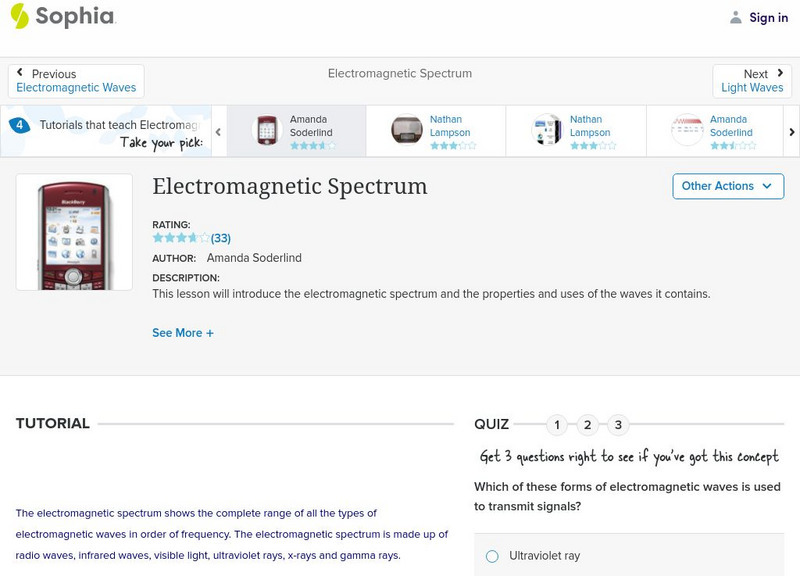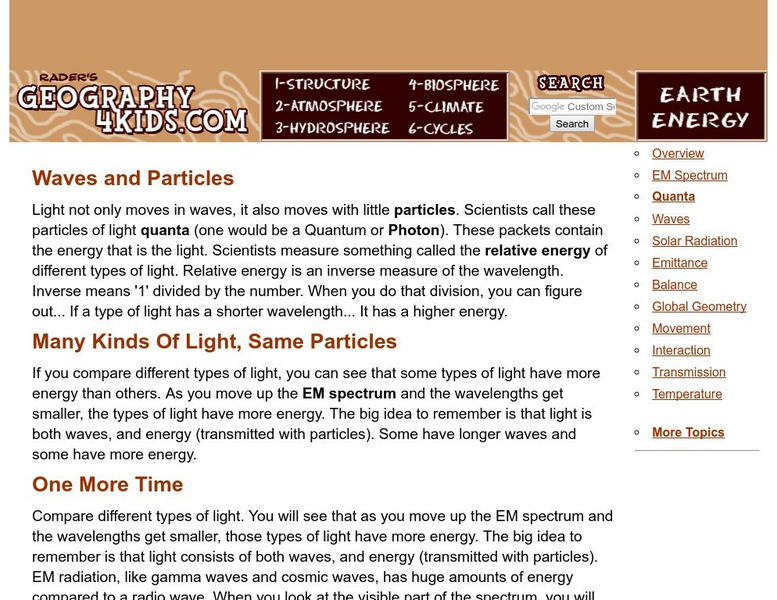Science Education Resource Center at Carleton College
Serc: How Can We Measure the Wavelength of Light Emitted From Stars?
This activity is designed for students to apply their knowledge of mathematics and physics to "real life" situations. Students are presented with the situation that they are on a camping trip and wish to know the wavelength emitted by a...
NASA
Electromagnetic Spectrum: Ultraviolet Waves
Ultraviolet (UV) light has shorter wavelengths than visible light. Though these waves are invisible to the human eye, some insects can see them. The specific wavelength values are given. Uses and applications of these waves are explained.
Ducksters
Ducksters: Physics for Kids: Light Spectrum
Kids learn about the science of the light spectrum. Wavelengths and frequencies of the electromagnetic waves including visible light, primary colors, and subtractive colors.
Ducksters
Ducksters: Kids Science Projects and Experiments: Light Spectrum
Kids learn by experimenting with science. Project about the light spectrum.
University of Colorado
University of Colorado: Physics 2000: Quantum Atom
Several pages with an interesting discussion of the visible light spectrum and atomic absorption and emission line spectrum. Features excellent graphics, thorough and understandable discussion, and many interactive Java applets.
University of Colorado
University of Colorado: Physics 2000: Electromagnetic Waves
Using a student-teacher dialogue format, this page discusses the nature of light as an electromagnetic wave and the electromagnetic spectrum.
BioEd Online
Bio Ed Online: Rainbow in the Room
Students investigate the properties of visible light and the sequence of colors in the spectrum using light shone through water and prisms. The lesson plan and accompanying slideshow can both be downloaded.
NASA
Nasa: The Space Place: Why Is the Sky Blue?
Learn about colors of light by exploring how prisms work. Discover the different colors of the spectrum and how the visible light is what we see.
TeachEngineering
Teach Engineering: Engineering Your Own Spectrograph
Students use simple materials to design an open spectrograph so they can calculate the angle light is bent when it passes through a holographic diffraction grating. A holographic diffraction grating acts like a prism, showing the visual...
Georgia State University
Georgia State University: Hyper Physics: Wave Particle Duality
The dualistic nature of light is discussed. The photoelectric effect and the Davisson-Germer experiment are contrasted as empirical evidence supporting each of the two views - particle and wave - of the nature of light. The photoelectric...
TeachEngineering
Teach Engineering: Designing a Spectroscopy Mission
Students find and calculate the angle that light is transmitted through a holographic diffraction grating using trigonometry. After finding this angle, student teams design and build their own spectrographs, researching and designing a...
Utah Education Network
Uen: I'm So Bright! I Wear My Shades Indoors!
This lesson engages students in learning about light through multiple sources. Students will learn how light is produced, reflected, refracted, and separated. Students will communicate their findings through an independent project that...
Utah Education Network
Uen: Enlightening Explorations, Part Ii
This lesson plan engages students in learning about light. Studets will describe how light is produced, reflected, refracted, and separated.
Utah Education Network
Uen: Enlightening Explorations, Part Iii
This lesson contains the following labs: Rainbows, Refraction with Prisms, and What Color Is It? Students will study light by reading various nonfiction texts and viewing a video lesson. Then students will engage in the following labs:...
TeachEngineering
Teach Engineering: Waves: The Three Color Mystery
Students are presented with a challenge question concerning color blindness and asked to use engineering principles to design devices to help people who are color blind. Using the legacy cycle as a model, this unit is comprised of five...
Science Struck
Science Struck: Wavelength of Visible Light Spectrum
Explains where visible light fits into the electromagnetic spectrum and the wavelengths for the different colors we see.
University of California
Center for Science Education: Gallery
A gallery of astronomy images which depict galaxies, comets, the moon, planets, nebulae, supernovae as seen in various regions of the electromagnetic spectrum. Each image in the gallery is described. Fascinating!
Sophia Learning
Sophia: Electromagnetic Spectrum: Lesson 2
This lesson will introduce the electromagnetic spectrum and the properties and uses of the waves it contains. It is 2 of 4 in the series titled "Electromagnetic Spectrum."
Sophia Learning
Sophia: Electromagnetic Spectrum: Lesson 3
This lesson will introduce the electromagnetic spectrum and the properties and uses of the waves it contains. It is 3 of 4 in the series titled "Electromagnetic Spectrum."
Sophia Learning
Sophia: Electromagnetic Spectrum: Lesson 4
This lesson will introduce the electromagnetic spectrum and the properties and uses of the waves it contains. It is 4 of 4 in the series titled "Electromagnetic Spectrum."
Sophia Learning
Sophia: Electromagnetic Spectrum: Lesson 1
This lesson will introduce the electromagnetic spectrum and the properties and uses of the waves it contains. It is 1 of 4 in the series titled "Electromagnetic Spectrum."
Science Struck
Science Struck: Visible Color Spectrum Wheel
A brief explanation of the visible color wheel.
Geography 4 kids
Geography4 kids.com: Waves and Particles
Understand how light moves in small particles in the electomagntic spectrum.
Georgia State University
Georgia State University: Hyper Physics: Color
This site from Georgia State University discusses the location of visible light on the electromagnetic spectrum. Includes the wavelength values for various colors of light within the visible light spectrum.
Other popular searches
- Light Spectrum
- Visible Light Spectrum
- Light and Color Spectrum
- Light Spectrum Stars
- Light Spectrum Waves
- Light Spectrum Activity
- Light Spectrum and Colors
- Light Spectrum and Waves
- Newton's Light Spectrum
- Light Spectrum \ Stars






